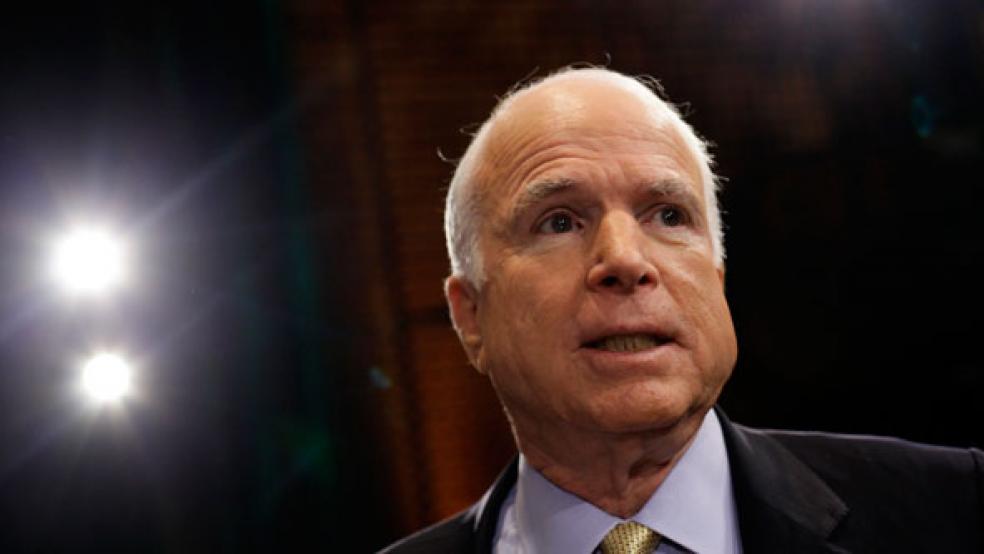If there were any doubts that Republicans are in the throes of ideological fratricide that could threaten their prospects for success this fall, they were dispelled over the weekend in Arizona.
In a move both bizarre and ill-timed, Arizona Republican Party members voted to censure Sen. John McCain – a highly-decorated Vietnam War hero, maverick conservative and 2008 Republican presidential nominee – for being too liberal for their taste.
Related: 7 Senate Seats Most at Risk—Hint: They’re All Blue
“Only in times of great crisis or betrayal is it necessary to publicly censure our leaders,” stated the resolution which was approved by acclamation. “Today we are faced with both. For too long we have waited, hoping Senator McCain would return to our Party’s values on his own. That has not happened.”
McCain’s offenses cited in the resolution included working on comprehensive immigration reform, or “amnesty,” and not going along with last year’s conservative strategy to “defund” President Obama’s signature health-care law, according to a report in The Arizona Republic.
The resolution reads like a federal indictment on espionage charges, condemning McCain “for his continued disservice to our state and nation,” and said state Republican leaders “will no longer support, campaign for or endorse John McCain as our U.S. Senator.”
McCain’s office declined to comment on the resolution over the weekend, but former three-term Republican Sen. Jon Kyl told the newspaper that the move – while not exactly surprising given growing disenchantment with McCain – was “wacky.”
“I’ve gone to dozens of these meetings and every now and then some wacky resolution gets passed,” Kyl said. “But most people realize it does not represent the majority of the vast numbers of Republicans.” Kyl added that McCain’s voting record was “very conservative.”
Indeed, McCain was rated 91 percent by the American Conservative Union on his positions last year and holds a lifetime positive rating of 87 percent. McCain was once touted as a “maverick” independent who voted close to the ideological middle of the Senate.
After losing to Obama in the 2008 presidential election, McCain made such a dramatic shift to the right that by 2010 he was tied with Tea Party favorite Jim DeMint of South Carolina for the title of the Senate’s most conservative member, according to a National Journal analysis.
McCain’s sins, in the eyes of state party Republicans in Arizona, include his support of the Senate-passed bipartisan immigration reform bill that would provide 11 million illegal immigrants a pathway to citizenship. State Republican officials are adamantly opposed to any bill that smacks of “amnesty” for illegal immigrants and their children.
Related: McCain the Maverick Takes on Cruz the Firebrand
Another sin committed by the often-free-wheeling, combative McCain was clashing with rising conservative Senate stars, including Rand Paul of Kentucky, Ted Cruz of Texas and Mike Lee of Utah, over national security and budget policy as well as Obamacare.
Last March, McCain told the media that Cruz, Paul and Rep. Justin Amash (R-MI) were “wacko birds” for their outspoken brand of politicking on the Hill. McCain also criticized Paul for his nearly 13-hour filibuster that pressured the Obama administration to clarify its position on the use of domestic drones, calling it a “disservice to a lot of Americans.”
McCain later apologized for the “wacko birds” comment, but not before Paul in a speech to conservatives dismissed McCain as part of the old guard of the GOP that “has grown stale and moss covered.”
Related: Can McCain Help Obama Win Fiscal Fight with GOP?
His final misdeed was to side with Democrats last fall in deriding GOP efforts to block passage of a budget and threaten a government shutdown to force cuts in spending for the Affordable Care Act. In a Sept. 25 floor speech that drew Democratic praise and GOP hostility, McCain said that while he had vigorously opposed passage of Obamacare, “elections have consequences.”
“I'd remind my colleagues that in the 2012 election, Obamacare . . . was a major issue in the campaign,” he said. “I campaigned all over America for two months everywhere I could, and in every single campaign rally I said, ‘And we have to repeal and replace Obamacare.’ Well, the people spoke. They spoke, much to my dismay, but they spoke, and they re-elected the president of the United States.”
Many in the Arizona Republican Party have been apoplectic about these offenses and couldn’t wait to formally convey their displeasure – although McCain’s current term isn’t up until 2016, when he turns 80. He announced in October that he was considering running for a sixth term.
Timothy Schwartz, who authored the censure, said McCain “has abandoned us” and called on party leaders to hold him accountable. McCain always works with Democrats but not with Republicans,” Schwartz said, speaking in support of the censure.
Such interparty tensions could have troubling consequences for Republicans this year in their bid to retain control of the House and recapture a majority in the Senate. Seven of 12 Republican senators up for reelection – including Minority Leader Mitch McConnell of Kentucky – are facing primary challenges from Tea Party candidates.
For now, Sen. Thad Cochran of Mississippi appears to be the most endangered GOP incumbent. The politically potent Club for Growth has endorsed his primary challenger, state senator Chris McDaniel. The other Republicans facing primary challenges appear to be in pretty good shape.
Yet just a few Republican primary upsets – as we saw, for example, in Indiana and Missouri in 2012 – could result in a weaker general election field and costly losses for the GOP.
Top Reads from The Fiscal Times:
- 7 Promises Obama Will Make at the State of the Union
- Credit Card Hack Attacks Reach a Tipping Point
- Confusion Over Deadlines Jeopardizes Obamacare





